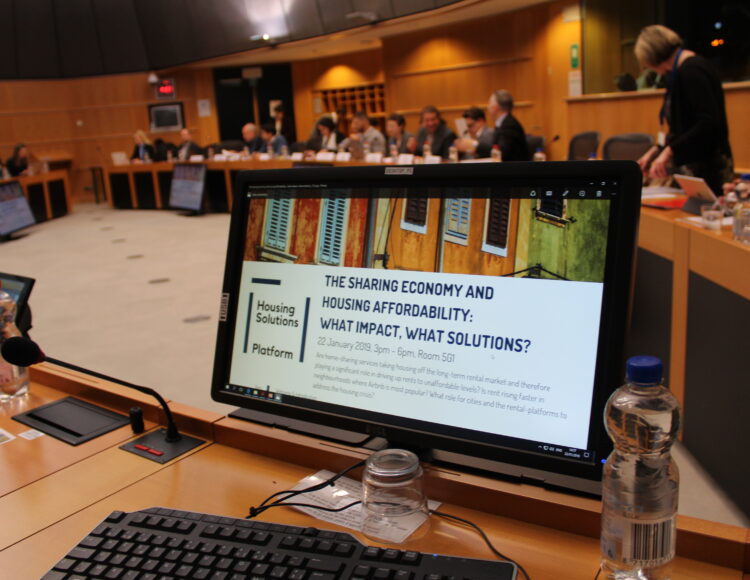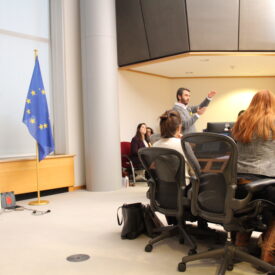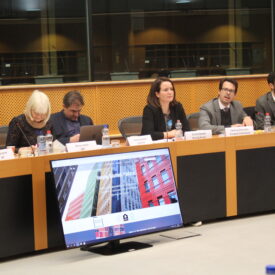The debate was organized by the Housing Solutions Platform and hosted by MEPs Marian Harkin (ALDE) and Brando Benifei (S&D) in the European Parliament, to respond to the controversy on the impact of the sharing economy on housing affordability.
Why this event?
Short-term rental platforms (such as Airbnb, HomeAway and others) have developed over the past few years thanks to technological developments. Their impact on cities and communities is starting to be analyzed but remains disputed. The new business model, which enables private property owners to rent part or all of their apartments to guests, faces increasing controversy particularly as to its impact on housing prices. This Housing Solutions Platform debate proposed to gather cross sectoral actors and experts to discuss the claim and potential way forwards. Representatives from the P2P industry, academics, city representatives and European policy makers debated on the existing evidence and potential ways forwards in channeling the impact of the sharing economy on housing prices.
Not enough data, but evidence of a decisive impact in some urban areas
There is little empirical evidence about the impact of the sharing economy platforms on housing prices. First results from two pieces of research about the impact of the presence of Airbnb on prices and rents in the USA and in Barcelona were presented. Despite methodological challenges, which make their results fragile, both studies indicate a decisive contribution of short-term rentals in rents and housing prices. Davide Proserpio from the University of Southern California, presented the results of one of the major studies on the impact of AirBnB on housing prices in the US, based on an analysis of Airbnb dataset listings in the US over a six year period (2011-2016). The results of the study show that Airbnb increases both rental rates and housing prices. It would explain 0.59% of the annual increase in US rental rates and 0.82% of the annual increase in US housing prices.
Miquel-Àngel Garcia-López, Associate Professor Department of Applied Economics School of Economics and Business in Barcelona, presented the initial results of one of the first studies on this theme in Europe. It concluded similar effects, namely that a 1-point increase in Airbnb density would lead to increases in rents of 0.5 to 1% and increases in prices of 1 to 1.8% in Barcelona
The US study suggests the impact can be explained by the fact that a percentage of property owners remove their flats from the long-term rental market, expecting higher revenues from the short-term rentals market. They thereby contribute to a decrease in available housing and a subsequent rise in rent.
Participants welcomed these studies and agreed on the need for more research on this topic to allow empirical based policy-making. Representatives from the P2P industry insisted on their willingness to engage in the debate and called for proportional regulation adapted to opportunities offered by new technological development.
The way forward: evidence-based regulation adapted to fast changing technological developments
Several cities have started to introduce regulation of short-term rental activity. Indeed, AirBnb Public Policy and Campaign Manager Sergio Vinay informed attendees that Airbnb has made over 400 agreements with local and national governments across the globe. Representatives of local government have stressed the need to differentiate between professional and occasional use. In order to do so, regulations usually distinguish between primary and secondary homes. In some countries, like France or Germany, large cities have introduced limitations on the number of days a home can be subjected to short-term rental. Dublin City Council presented forthcoming legislation that will require property owners to seek planning permission before letting properties out short-term from June 2019. In Barcelona, the tourism strategy of the city implies differentiating regulation of tourist accommodation in different neighbourhoods, including a ban on new tourist accommodation in the city centre. In Amsterdam, the city has created a team to work on illegal short-term renting. In some places, short-term rental providers have started to collaborate with local authorities on regulation enforcement. This work needs to be continued, focusing on the general interest of the population rather than of the interest of some individuals.
The regulation of short-term rentals should be handled cautiously because of its complex effects. Carlos Villaro Lassen, Secretary General of the European Holiday Home Association mentioned a recent study by the London School of Economics which shows that regulation of secondary homes can lead to negative effects on local economies.
Sito Veracruz, Founder and Coordinator Legal and Public Sector of FairBnb, the cooperative vacation rental platform that operates on principles of “one host, one home”, transparency and 50% of profits being invested into community projects, suggested our collective goal should be to decrease the negative impacts and increase the positive impacts of the sharing economy.
The European Commission representative recalled that it seeks to promote a sustainable development of the sharing economy. He insisted on the need not for harmonization of rules but of principles, to be adapted to the diversity of local realities. Recalling the E-commerce directive and Service directive, the principle is that any restriction to an economic activity must be justified, must have a direct link to the desired impact of the regulation and must be proportional.
Key take-away
To conclude, short-term rentals cannot be solely blamed for rises in house prices and rent, but they do appear to have a clear impact on these figures. It is becoming increasingly difficult to claim that there is little or no evidence of this. Policy makers are facing a real challenge in dealing with this growing phenomenon, which requires tailor-made solutions for each local situation.
Despite the conceptual challenge, the dramatic human impact of housing financialization remains a reality . The sharing economy platforms seem to be participating to this broader phenomenon. Therefore, the challenge is to accompany the development of P2P platforms who seem to have become an unavoidable consequence of technological development, disrupting the housing market. As recalled by the organizing members of the European Parliament, “it is urgently necessary to come together to find the right balance between social and business interests” B. Benifei. “At the end of the day a home is for shelter… it’s a primal need… the sharing economy is part of the problem and it has to be part of the solution” M. Harkin. All speakers of the debate agreed that data exchange and cooperation is the main way forward.
The Housing Solutions Platform is a partnership between FEANTSA, Fondation Abbé Pierre and Housing Europe, aiming at stimulating creativity and courage in overcoming housing exclusion. The next Housing Solutions Platform debate, The Role of the Private Market in Ensuring Housing for All, will be held on 19th of February in the European Parliament. All research papers cited during the event will be available on the Housing Solutions Platform website in the upcoming days.



